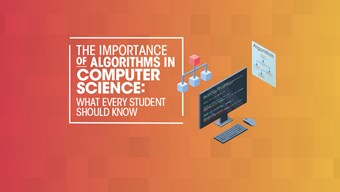Computer science is an expansive field, and there are fundamental skills you’ll develop studying computer science which can be beneficial to many roles and workplaces. If you’re considering a computer science degree and want to know more about the hard and soft skills you’ll gain and foster over the duration of your course, our guide below will help.
By Grant Longstaff. Published 23 May 2023.
Hard skills
Hard skills focus on the knowledge and attributes you’ll need to thrive in your chosen field.
Programming languages
Computer science involves building and testing programs, so think of programming languages as your bricks and mortar. Over the duration of your course, you’ll learn and use several programming languages, and the more languages you know, the greater your CV will look to potential employers.
Software development
Software development involves designing, building, and maintaining software, which could be anything from mobile phone apps to organisation specific programs. Having the vision to not only design a system, but the necessary skills to create it too, will be highly desirable for many roles in computer science.
Data analysis
Another key aspect of many computer science roles is the ability to effectively analyse and interpret complex data. During your studies, you’ll develop your ability to not only understand how systems and programs work but analyse why they behave in certain ways. You’ll learn to identify patterns and trends and use the data to develop new strategies and inform any future development.
Technical writing
Technical writing is the ability to convey complicated ideas and instructions clearly. Whether its removing barriers created by jargon or writing a manual for the program you’ve written, the ability to break down complex information into easily understandable language will help you stand out from the crowd.
Mathematics
You’ll find numbers buried in code and hidden among the algorithms you encounter throughout your studies, and so it stands to reason that you’ll develop your maths skills. Your ability to create difficult formulas and interpret intricate statistics will show potential employers your keen eye for problem solving and detail.
All of this said, Dr Paul Sant, our head of Computer Science, states whilst, “computer science is a multi-faceted discipline, and some roles are very specific in terms of the hard skills you require, having a broad understanding of software, hardware, cyber security and problem solving will set you up well for entering many technical roles.”
Soft skills
Where hard skills are often subject and industry specific, soft skills are those abilities which could be beneficial throughout your professional life, regardless of your role or sector.
Problem solving
Using computers to solve problems is a cornerstone of computer science. You can use the analytical approach developed during your studies to show potential employers your ability to adapt, calmly identify issues, and create informed strategies to address them.
Communication
We’ve already discussed how computer science can involve communicating complicated ideas. However, this skill extends far beyond the world of IT and will be a desirable trait in most fields of work. If you can communicate effectively, your working relationships will be all the better for it.
Teamwork
When it comes to using machines to solve some of the most complicated problems facing our world today, you’ll usually find a team of people behind it. So, whether you’re creating a program or building a website, there’ll be plenty of opportunity for group work throughout your degree. Let potential employers know about your teamwork skills and show them what you can bring to their organisation.
Time management
Studying requires effective time management in order to succeed. You’ll need to manage your revision, essay and assignment writing, group projects, and presentations. Managing your time will also be useful in the workplace once you have to meet set deadlines and targets.
Creativity
With computer science requiring so much problem solving, it’s only natural your creative abilities will develop throughout your time at university. Many employers look for candidates who can spot problems in the workplace and come up with inspired solutions to address it. Let your potential future boss know exactly what you can bring to the table.
Remember, this is by no means a definitive list of the hard and soft skills you’ll gain. For more insight into the skills you could develop, make sure to look at what the course modules cover and how they can shape your employability. For instance, our MSc Computer Science (Conversion), includes modules on artificial intelligence and cyber security, and our BSc (Hons) Computer Science offers modules on psychology.
Whether you’re an undergraduate looking to study our BSc (Hons) Computer Science, considering a career change through our MSc Computer Science (Conversion), or take an interest in Artificial Intelligence for Business, we have you covered.



